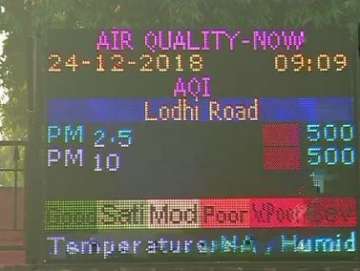Pollution level severe for third consecutive day in Delhi
A CPCB-led task force has directed authorities to intensify ground actions to enforce measures already in place, particularly to control emissions from vehicles and burning of biomass.

Pollution in Delhi remained in the 'severe' level for the third consecutive day as wind speed and other meteorological factors remained "highly unfavourable" for dispersion of pollutants on Monday, according to authorities.
People have been advised by the authorities to minimise outdoor activities and avoid use of private vehicles.
While the Central Pollution Control Board (CPCB) data showed the overall air quality index (AQI) at 'severe' level of 445, the Centre-run System of Air Quality and Weather Forecasting (SAFAR) showed a higher AQI of 477.
An AQI between 100 to 200 comes under the 'moderate' category, 201 and 300 is considered 'poor', 301 and 400 'very poor', while that between 401 and 500 is 'severe'.
On Monday, 32 areas of the national capital recorded 'severe' air quality while five areas recorded very poor air quality, according to the CPCB.
In NCR, Noida recorded the worst air quality with an AQI of 464. Faridabad and Ghaziabad also recorded 'severe' air quality, the CPCB said.
The overall PM2.5 level -- fine particulate matter in the air with a diameter of less than 2.5 micrometer -- was recorded at 369 and the PM10 level at 533 here, the CPCB said.
Delhi's air quality turned severe on Saturday. On Sunday, the year's second highest pollution was recorded at an AQI of 450.
According to the Indian Institute of Tropical Meteorology, the air quality is likely to improve on Tuesday, but will remain in the upper end of the 'very poor to severe' category.
"The wind speed and ventilation index are highly unfavourable for dispersion of pollutants," it said.
Ventilation index is the speed at which pollutants can get dispersed. The ventilation index lower than 6000 sqm/second with average wind speed less than 10 kmph is unfavourable for dispersion of pollutants.
The index was 4500 sqm/second on Monday, it said.
A CPCB-led task force has directed authorities to intensify ground actions to enforce measures already in place, particularly to control emissions from vehicles and burning of biomass.
The other directions are: agencies concerned to increase surveillance to find industrial waste dumping or burning especially in hotspots that are vulnerable to high pollution level, water sprinkling and mechanised sweeping to be intensified and traffic police to ensure smooth flow of traffic, including during long holidays.
The task force also urged people to avoid using private vehicles, particularly those using diesel as fuel, and minimise outdoor exposure for the next three to five days, especially those with respiratory illness, the CPCB said.
The IMD said prolonged period of light winds and low temperature are likely to continue for the next three to five days, resulting in poor dispersion of pollutants and the current severe air quality may continue for next two to three days.
In a health advisory, the SAFAR asked Delhiites not to rely on common dust masks for protection.
The agency has advised Delhiites to avoid all outdoor activities, such as taking walks. "If the room has windows, close them, if the air conditioner provides a fresh air intake option then choose it, avoid burning anything such as wood, candle or even an incense," it said.
The advisory also recommended frequent wet mopping and using masks known as N-95 or P-100 respirators only for outdoor activities.
"Do not rely on dust masks for protection," the advisory added.